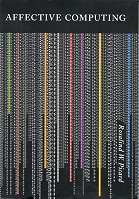Picard's thesis is that fully intelligent computers need to detect, understand, and possibly even "have", emotions, for two reasons. Firstly, we humans are emotional beings, and computers need to understand this facet of our behaviour in order to interact intelligently and sensitively with us. Secondly, we use our emotions to help us make decisions, to help prune search spaces, to tag poor decisions as "bad", and so on, and so maybe computers need a similar facility to help them reason. In this second case, there is no reason why the computers' emotions would need to be related to any particular human emotion.
The first point seems reasonable enough. I was less convinced by this second point. The description of people with particular brain damage that removes their emotions, who can say in a test what is the right thing to do, but fail to do it in reality, seems to be missing a step. If they do know intellectually what to do, but still don't do it, why not? Saying, "because they don't have emotions" seems to be begging the question. Also, we might use emotions to weight our decision paths, but does a computer have to use the same mechanism? Or maybe such a weighting is perceived as emotion? In which case emotion would be more of an emergent property than something to be designed in. These ideas are touched on, but I would have liked to have seen more discussion along these lines.
The first part of the book explains how such an affective computer would be more useful, more responsive, more intelligent. It also explores some of the potential downside to computers knowing so much about us, and also to them have "negative" emotions. (Computers are frustrating enough now -- do we really want them to trash our work out of spite?) The second part is described as showing how to give computers the ability to perceive and understand emotions, but is actually more of a treatise on various models of human emotions, with relatively little discussion of how these ideas might be enabled in machines, as this is still mostly only a research topic. The last chapter is on the development of "wearable" computers, fully up-close and personal assistants. (This overlaps a little with another MIT Media Lab writer's account in When Things Start to Think.)
An interesting account, with lots of food for thought, but I would have liked to have seen rather more about the computers.
